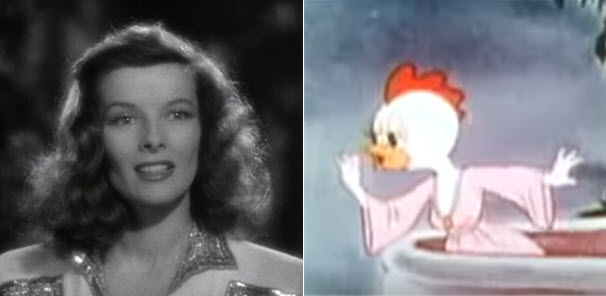You may have seen movies from the 30s and 40s and thought that everyone of that time spoke at a rapid clip and either like a gangster (“Why I aughtta…”) or a high society matron caught somewhere between New York and London. Their way of speaking sounds impossibly old fashioned, and that’s because it is. It’s also not an organic American accent and never was.
My maternal grandparents were almost the exact age of Viv and Charlie. They were born and raised in rural Ohio instead of Chicago, but I can tell you that they spoke nothing like any of the characters in old movies. They sounded… well, like normal Midwestern people. They didn’t speak hyper fast or with strange accents halfway between American and British English. What you hear in those old movies is something called the Transatlantic or Mid-Atlantic accent – because it’s halfway between British and Eastern Seaboard American English – i.e. completely made up.
This short video from How Stuff Works explains it perfectly.
This was a learned accent and was mainly taught in boarding schools on the east coast through WWII. Boarding schools exactly like the one Vivian’s mother attended. In fact, Vivian mimics her mother’s affected mid-Atlantic speech to Charlie in the beginning of the The Darkness Knows. She mimics it because it sounds so silly and posh to Vivian’s Midwestern ears even in 1938. If you don’t think this accent was something strange and exotic to the average person even then, check out this Merrie Melodies cartoon from 1938. The chicken playing Juliet, clasping her hands together and saying “Raaally I do”, is a parody of Hollywood actresses of the time – Katharine Hepburn, in particular.*
Vivian, on the other hand, has not gone to boarding schools on the East Coast. Her accent is the flat Midwestern of wealthy Northside Chicago. She doesn’t pronounce potato as “po-tah-toe” and pronounces double t’s as d’s – “cludder” not “cluh-tuh”, for example.
The Transatlantic accent was highly used in movies, theater, and radio productions of the day though. Why? Likely just because it sounded so posh and high society, and because it was hard to place. It gave a sense of worldliness to a production. This all died out after WWII. The accent stopped being taught in boarding schools and stopped being used in theatrical productions – unless, of course, it’s a production mimicking 1930s and 40s theatrical speech.
So the answer is Julia Witchell sounded a lot like Katherine Hepburn (or the Juliet chicken in that cartoon), but her daughter, Vivian, sounded just like a girl from Chicago – rather like me I suppose. Charlie, sadly, doesn’t sound like Edward G. Robinson or Jimmy Cagney. He grew up in a more working class part of the city, so he’s probably a little rougher on the grammar and diction than Vivian, but their accents and way of speaking would be similar to each other and to the people of Chicago today. (And nothing like the characters they would have watched in the movies).
*Cary Grant’s much parodied accent is probably the paragon of Transatlantic examples. It’s a result of his trying to Americanize his natural lower-class British accent. He wound up with a peculiar mix of both accents quite specific to him, as you can hear.

